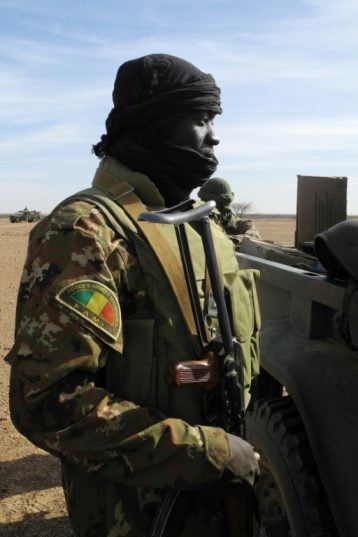Over 67 000 apply for 5 500 police trainee jobs in 24 hours
So far more than $350 million has already been pledged for the G5 Sahel force, gathering Burkina Faso, Chad, Mali, Mauritania and Niger — countries in the frontline of a war against Islamist militants yet which rank among the poorest in the world.
The money has enabled the force to set up a headquarters and command structure and carry out two operations, with French support, in the troubled “tri-border” area between Mali, Niger and Burkina Faso.
But more is needed to help the force reach its target of 5,000 men, pooled from the five nations’ armies, provide training and equipment, and durably restore authority in lawless areas.
Intended to become fully operational in mid-2018, the G5 Sahel force operates alongside France’s 4,000 troops in the area and the UN’s 12,000-strong MINUSMA peacekeeping operation in Mali.
The five Sahel countries will make a pitch for funds at a meeting in Brussels on Friday.
The drive behind setting up the G5 Sahel force dates back to 2015, when Mali’s government signed a peace agreement with coalitions of non-jihadist armed groups.
Islamist insurgents remained active — violence spread from the north of the country to the centre and the south, and then spilled over into Burkina Faso and Niger.
Today, as the new force is starting to take shape, the jihadists are becoming more sophisticated in their operations, say experts.
On February 5, the head of French military intelligence, General Jean-Francois Ferlet, said there had been a surge of jihadist attacks in central Mali.
The attacks “are a bit more lethal because (the assailants) are improving their methods,” he said.
A European security expert in the Mali capital Bamako told AFP said the jihadists had made strides in the handling of explosives.
“When a mine slices a vehicle in half like a loaf of bread, it’s no longer a home-made device,” he said pointedly.
Jihadists have carried out killings of UN peacekeepers and Malian soldiers. In one incident in January, 26 civilians were killed when their vehicle ran over a landmine in Boni, central Mali.
Progress against the rebels seems meagre, if the official records are anything to go by. The joint force’s second operation, which mobilised Malian and Burkinabe battalions on both sides of the border from January 15-28, listed seizures of ammunition, explosives materials and motorcycles, but little else.
– Morale –
Malian President Ibrahim Boubacar Keita, in a visit to the central town of Boni, argued that the jihadists had been “driven mad” by the emergence of the G5 Sahel and by the “fierce determination” of Malian troops.

Five countries — Burkina Faso, Chad, Mali, Mauritania and Niger — make up the G5 Sahel force
On the ground, though, morale is a clear source of concern.
In January, 36 Malian officers deserted and a sergeant was arrested for releasing a video in which he complained about incompetence and the lack of military strategy.
The government promised to provide “the best conditions” for the troops and appointed a number of senior state officials in central Mali, in a show of support.
Hearts and minds, too, are another front for the G5 Sahel force to conquer.
A report published earlier this month by MINUSMA’s human-rights division found that “at least 20 percent” of recorded incidents in 2016 and in the first of half of 2017 that endangered civilian lives involved the Malian authorities — essentially the security forces.